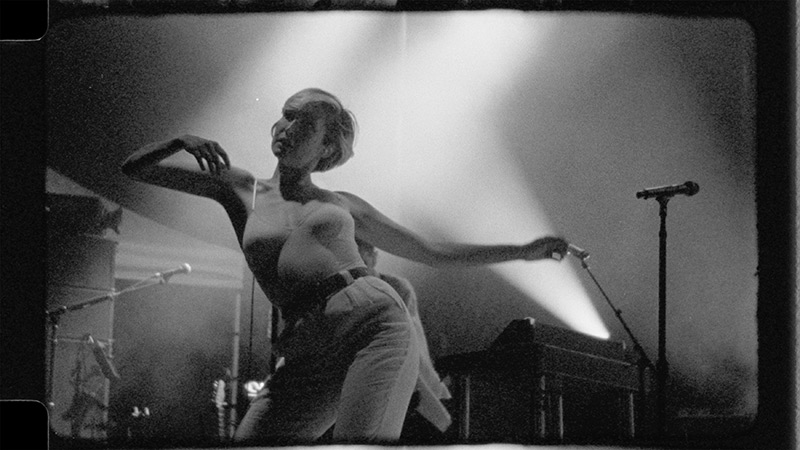July Talk: Love Lives Here
Review By Maurie Alioff
Recently, I discovered two Canadian bands I knew little about. Winnipeg’s The Weakerthans tweaked my radar via Jonathan Goldstein’s hilarious and often moving podcast, Heavyweight. Their Edward Hopper-inspired song, Sun in an Empty Room, is the signature closing of Goldstein’s show.
At Hot Docs 2023, I got a crash course in Ontario’s July Talk at a screening of Brittany Farhat’s (pictured below) debut feature, July Talk: Love Lives Here. Both groups share punk roots that morphed into melodic/poetic sensibilities. Both tour frequently although for the moment, The Weakerthans are in hiatus, and during the COVID mess, July Talk was forced to get off the road.

Farhat’s driving, montage-heavy film builds around July Talk’s coping with the pandemic, which coincided with Trump’s malevolent distortions of reality, George Floyd’s murder, the exploding of the BLM movement, and a personal crisis: co-front Peter Dreimanis discovering he had Type 1 Diabetes.

Dreimanis’s co-lead is Leah Fay Goldstein, known usually as Leah Fay (pictured above). She is a focal point in July Talk’s performances and obviously in the movie. Supple, sexy, Leah sings in a girlish Tori Amos-ish voice, in contrast with Dreimanis’s growl. Her enigmatic hand movements, startled eye-popping expressions, and flailing, balletic body language give the band a dazzle. Off stage, Fay, like Dreimanis seems like a practical-minded person who knows how to code shift into a flamboyant purveyor of ecstatic emotion.
In 2020, the band on the run made a risky decision to mount a full-scale show in a drive-in movie theatre where the audience would presumably be safe in their cars, the music blue-toothed to radios. Much of the film documents preparations for the concert, intended as a multi-layered performance event, not just another live concert.
 The black and white documentary is itself muti-layered. It’s a backstage portrait of talented musicians, a film about the impact of COVID on touring bands, an affirmation of love and empathy, as the title suggests. At one point, when a yahoo in a past show shouts at Leah, who sometimes wears bra tops, “Show us your tits,” she confronts him with his misogyny.
The black and white documentary is itself muti-layered. It’s a backstage portrait of talented musicians, a film about the impact of COVID on touring bands, an affirmation of love and empathy, as the title suggests. At one point, when a yahoo in a past show shouts at Leah, who sometimes wears bra tops, “Show us your tits,” she confronts him with his misogyny.
The doc even briefly becomes a meditation on the charms of drive-in movie theatres. The privacy, the potential for intimacy, the concession stands, the rural air and stars overhead. One of the band remembers seeing Jurassic Park for the first time in a drive-in. I’m pretty sure I saw my first movie, at about age five, in a drive-in. The venue in the doc is the Stardust in Sharon, Ontario. As a teen, friends and I followed the beach in upstate New York with the Stardust, or another theatre in the area.
In the doc’s ecstatic finale, Leah jumps off the stage and climbs up on a car rooftop, still singing. She lies on it, murmuring, “Honk, Honk!,” and then “Double Flash, Double Flash.” The audience responds, becoming part of the show. An overhead of the flashing headlights suggest the starlight above the Stardust Theatre in Sharon Ontario. Drive-ins connect you to the universe.
The finale moment is matched by an earlier scene when July Talk’s backups, James Baley and Kyla Charter – both black performers in their own right – take the arm-dancing lead on the gospel-inflected song Champagne. It’s the song that gets the longest play in the movie, and the intro goes:
Give me a sip of that sweet life
Don’t tell me the grass ain’t greener there
Give me a taste of that sweet life
Don’t tell me, ’cause it’s gonna be mine
July Talk: Love Lives Here manifests longing and hoping in a world that has been shrouded in darkness. No release date has been announced.
![]() Maurie Alioff is a film journalist, critic, screenwriter and media columnist. He has written for radio and television and taught screenwriting at Montreal’s Vanier College. A former editor for Cinema Canada and Take One, as well as other magazines, he is affiliated with the Quebec media industry publication, CTVM.Info. His articles have appeared in various publications, including Canadian Cinematographer, POV Magazine, and The New York Times. He is the Québec Correspondent for northernstars.ca.
Maurie Alioff is a film journalist, critic, screenwriter and media columnist. He has written for radio and television and taught screenwriting at Montreal’s Vanier College. A former editor for Cinema Canada and Take One, as well as other magazines, he is affiliated with the Quebec media industry publication, CTVM.Info. His articles have appeared in various publications, including Canadian Cinematographer, POV Magazine, and The New York Times. He is the Québec Correspondent for northernstars.ca.


